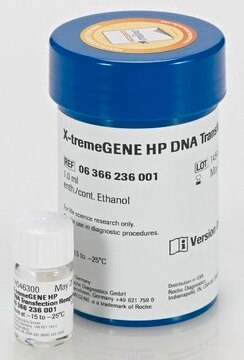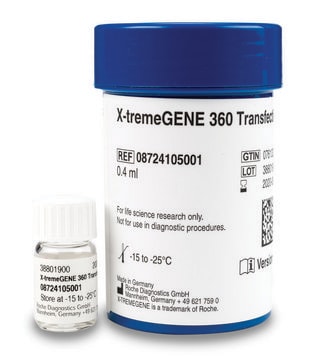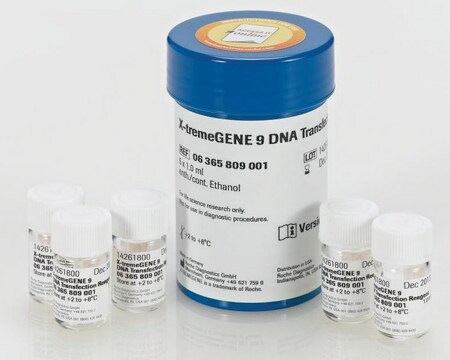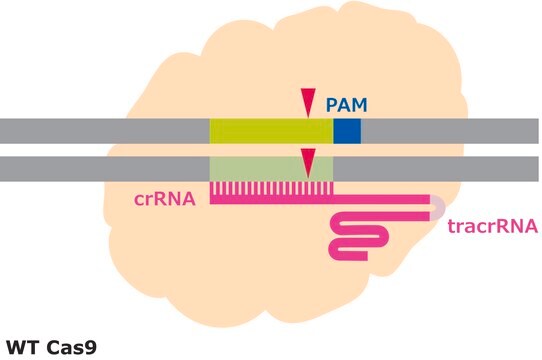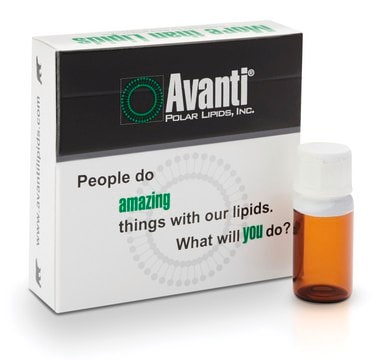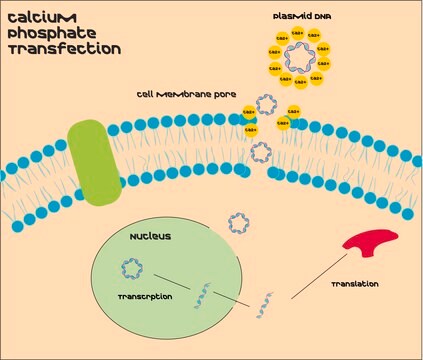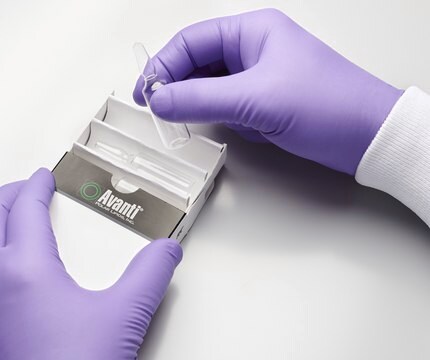SITRAN-RO
Roche
X-tremeGENE™ siRNA Transfection Reagent
Polymer reagent for delivering siRNA to common cell lines
About This Item
Recommended Products
grade
for molecular biology
Quality Level
usage
sufficient for 2,000 transfections (04476115001)
sufficient for 400 transfections (04476093001)
packaging
pkg of 1 mL (04476093001 [1 mg/ml])
pkg of 5 × 1 mL (04476115001 [5 x 1 mg/ml])
manufacturer/tradename
Roche
concentration
1 mg/mL
technique(s)
transfection: suitable
shipped in
wet ice
storage temp.
2-8°C
General description
This innovative reagent forms a complex with siRNA, as well as with mixtures of siRNA and plasmid DNA (cotransfection), and efficiently delivers the nucleic acids into animal cells to induce gene silencing. Transfection is achieved in just a few steps: mix and incubate diluted transfection reagent with diluted siRNA, then add this complex to cells. Because X-tremeGENE siRNA Transfection Reagent functions exceptionally well in the presence or absence of serum and demonstrates low cytotoxicity, it can be used without media changes. The product is animal-component free.
Contents
Solution filtered through 0.2 μm pore size membrane, supplied in polypropylene tubes.
Application
Features and Benefits
- Knock down gene expression over 90% in many different cell types.
- Maximize experimental flexibility with a single reagent for siRNA- and cotransfection-based gene-knockdown experiments.
- Produce meaningful results using a reagent that exhibits low cytotoxicity, ensuring that the cellular effects you observe are due to the transfected siRNA rather than the transfection procedure.
- Work with or without serum, avoiding medium changes (e.g., to serum-free medium) before or after transfection.;
X-tremeGENE siRNA Transfection Reagent is a proprietary blend of lipids and other components, free of animal products.
Quality
Cytotoxicity analysis: HEK-293 cells are exposed to siRNA/X-tremeGENE siRNA Reagent complexes for 72 hours in the presence of serum, without a media change. Cytotoxicity is then tested by analyzing the cells with the WST-1 Cell Proliferation Reagent (Roche).
Other Notes
Legal Information
related product
Storage Class Code
12 - Non Combustible Liquids
WGK
nwg
Flash Point(F)
does not flash
Flash Point(C)
does not flash
Certificates of Analysis (COA)
Search for Certificates of Analysis (COA) by entering the products Lot/Batch Number. Lot and Batch Numbers can be found on a product’s label following the words ‘Lot’ or ‘Batch’.
Already Own This Product?
Find documentation for the products that you have recently purchased in the Document Library.
Customers Also Viewed
Articles
Small inhibitory RNAs (siRNAs) have become the focus of interest in many laboratories. For the first time, these molecules offer an easy way to knock down the expression of selected genes in mammalian cells without having to resort to classical gene knockout techniques.
Transfection is the introduction of DNA, RNA, or proteins into eukaryotic cells and is used in research to study and modulate gene expression. Thus, transfection techniques and protocols serve as an analytical tool that facilitates the characterization of genetic functions, protein synthesis, cell growth and development.
This brief webinar provides an overview of what transfection is and the methods that are used to introduce DNA or RNA into eukaryotic cells.
Protocols
X-tremeGENE™ siRNA Transfection Reagent Protocol & Troubleshooting
Related Content
Browse our convenient transfection reagent selection guide to match the best reagent for your specific cell line and application needs.
Our team of scientists has experience in all areas of research including Life Science, Material Science, Chemical Synthesis, Chromatography, Analytical and many others.
Contact Technical Service